one of the United States' most brilliant and controversial generals whose commitment to the defense and reconquest of the Philippine Islands has since become legendary; son of senior US Army officer Arthur MacArthur, for whom he acted as aide in 1905, his career developed meteorically from his exceptional performance at West Point, where he graduated first in his class in 1903; as Chief of Staff and later 42nd Div commander during World War I, his reputation grew dramatically; described by the then US Secretary of War as the United States' best front-line general of World War I, accepted an appointment as Superintendent of West Point in 1919, became the youngest US Major General in 1925 and was promoted Chief of Staff of the Army in 1930. a political conservative, achieved some unwanted publicity for his involvement in the suppression of the Bonus Army in July 1932, at the height of the American Depression; also set in motion the limited development of tanks and other armored vehicles for the US Army; in 1935 stepped down as Chief of Staff to accept an appointment as military adviser to Philippine President Manuel Quezon; also charged with command of the small Commonwealth Army based in the Philippines, exagerrated both the importance of his position (for which he chose the title 'Field Marshal' and designed a sharkskin uniform) and the tactical and strategic significance of the Philippine-based force; but the rising tension between Japane and the US during 1941 prompted US Joint Chiefs of Staff to reverse their strategic policy for Pacific defense, recall MacArthur to the active list in July and provide at least a proportion of the reinforcements and funds he demanded fo the Philippines; despite his bold assessment in October that the Philippine forces now represented the key point in the US Pacific defensive strength, the initial Japanese invasion of the islands on December 8, 1941 overran the Filipino and US defense almost immediately, and he was forced to a last-minute retreat to save hif forces from imminent capture. having withdrawn with his forces to Bataan, the southern peninsula of the main island of Luzon, and besieged by the Japanese 14th Army under Gen Homma, endured the same privations as his men and at first refused to contemplate leaving his HQ on Corregidor to assume another command, as ordered by signal from the Presicend on February 22; having finally agreed to leave in his own time, delayed a further nine days before escaping at night with his wife and son in a high-speed dash with a party of four PT boats across Manila Bay and 600 miles of ocean to Mindanao; a few days later landed in Australia by B-17 to assume command of all US troops in the Pacific; arriving at Adelaide, faced a large group of reporters when making his famous, Caesarean promise: 'I came through and I shall return.' as Supreme Commander of the Southwest Pacific Area from April 1942, was utterly committed to defeating Japan before Germany; apparently bound by the grave responsibility of his promise to return, took for granted the central role of the Philippines in any attacks on the Japanese mainland, and persistently and agrumentatively promoted the earliest possible Philippine offensive, often at the expense of good relations with senior US commanders; nevertheless proposed and planned many of the operations which he commanded, with great courage and skill, against New Guinea, New Britain, New Georgia, the Admiralty Islands and the Solomon Islands, between 1942 and 1944; in this period developed the 'leapfrogging' tactics that combined the bold use of sea and air power with skilful amphibious landings to bypass large Japanese concetrations, allowing them to 'wither on the vine', and concentrate assaults on vulnerable communications lines; the tactic became an increasingly effective characteristic of US offensive strategy in the vast scatters of the Pacific island territories as the campaign progressed. in early October 1944, after weeks of raging argument which highlighted the personal as well as the professional rivalry between MacArthur and the US Navy, he was instructed by the Joint Chiefs to proceed with operations against the Philippines; his return was staged on a scale appropriate to his histrionic view of his mission; the largest amphibious operation of the war till then, the landings on Leyte island, launched a campaign that, though ultimately successful, would outlast the war itself; promoted a five-star general in December and Commander of all US forces in the Pacific in April 1945, controlled a huge force of nearly one and a half million men, until transferred to Tokyo in August to accept the Japanese surrender, signed on September 2; appointed Supreme Commander of the Allied Powers in Japan (SCAP), which administered and controlled the country after the war, stayed on in the Far East to command the US and UN forces in Korea until he was recalled because of his support for the use of the A-bomb against China to a belated hero's welcome in 1951; having failed to secure a nomination for presidential candidate in the election campaign of 1952, retired to live in Manhattan.
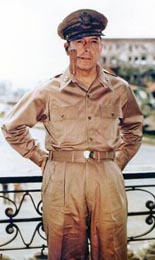
wartime member of the Soviet State Defense Committee from 1941, was a close associate and collaborator with Stalin in the Communist Pary's general Secretariat and had played a part in the political purges of 1937-8 that had rid Stalin of both real and imagined opposition to his regime; also seved as political commissar on a number of Russian fronts at Leningrad and Moscow in 1941, and at Stalingrad and the Don during 1942; from 1943-5 was Chariman of the Committee for the Restoration of the Economy in liberated areas of the Soviet Union.
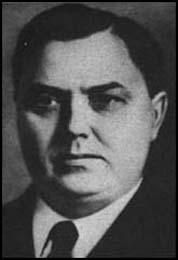
post-war Soviet Minister of Defense (1957-1967), first distinguished himself in command ot the 2nd Guards Army during the critical battle for Stalingrad; promoted to command the Southwest Front after the Russian victory on the Volga, was later transferred to lead the 3rd and 2nd Ukrainian Fronts, and directed successive Soviet victories in the Donhas, western Ukraine, Rumania and Hungary; Budapest fell to forces under him in February 1945; transferred again to command the Transbaykal Front in August, directed the successful campaigns against the Japanese Kuantung Army in Siberia.
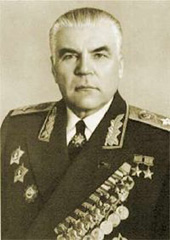
Finnish President and C-in-C of the Finnish Army, was of noble Swedish ancestry and had served in the Imperial Russian Army (while Finland formed part of the Tsarist Empire); returned to Finland when it declared its independence in October 1917 to lead the White Guard against the Bolshevik-supported Red Guard in the civil war of 1918; following defeat in the presidential election of 1919, retired from active politics until recalled in 1931 to head the National Defense Council and reorganize the Finnish Army; was responsible for the construction of the Mannerheim Line, stretching across 65 miles of Finland's southeastern frontier; in 1939 led the highly courageous but unsuccessful defense of Finland against Russian forces in the Winter War and continued to direct Finnish forces in co-operation with Germany in the 'Continuation War', which aimed to take back territory lost to Russian in 1940; his skill in negotiations, which had already won Finland reasonable armistice terms from Russia in 1940, again succeeded in achieving favorable terms with Russia in a separately negotiated peace settlement; was subsequently made President of Finland but retired in 1946.

generally regardes by historians as the most outstanding of the Third Reich's military strategists; as major general and chief of staff to von Rundstedt in Army Group South in 1939, suggested the invasion plan of France which was used by Hitler with spectacular results; in June 1941 in the invasion of Russia, commanded the LVI Panzer Corps for the advance on Leningrad; later that year took command of the 11th Army on the southeast front, which cut through the Crimea, and took Sevastopol. in July of the next year was promoted field marshal, and that autumn given command of Army Group Don; tried unsuccessfully to relieve Gen von Paulus's 6th Army, nominally under his command, and which was besieged at Stalingrad; throughout 1943 on the Eastern Front, achieved some tactical success, though his strategy at Kursk in July proved a costly disaster; his successive disagreements with Hitler eventually led to his dismissal on March 25, 1944; in the same period may have been involved in an unsuccessful plot originated by Gen Tresckow to assassinate Hitler; in the view of war historian Liddell Hart, was the Allies' most formidable military opponent, combining modern ideas of maneuver, a mastery of technical detail and great driving power.

developed German armored forces; led panzer divisions in Tunisia; commanded the 5th Panzer Army in the 1944-45 Ardennes offensive; later led the 3rd Panzer Army; remembered as one of the chief architects of Germany's armor-driven blitzkrieg.
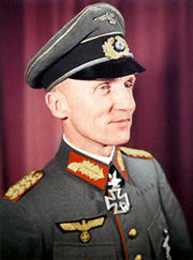
a founder-member of the Chinese Communist Party in 1921; between 1931 and 1934 attempted with Chou En-lai and Chu Teh, to establish a revolutionary base on the border of Hunan and a Chinese Soviet Republic in Kiangsi, before being forced by Chinese Nationalists under Chiang Kai-shek to trek to Shensi on the epic 'Long March'; collaborated with the Nationalist Kuomintang against the Japanese between 1937 and 1945; during this period, was based at Yenan, where he developed his political and military theories and instituted a purge of party officials; following the surrender of Japan in September 1945, resumed the struggle against Chiang's Nationalist forces.
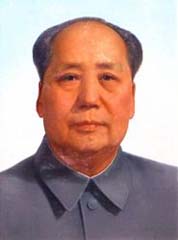
an immensely popular and able American general and administrator, chairman of the American Joint Chiefs of Staff and one of the key Allied strategists of the war, made a substantial contribution to the Allied victory in 1945; had already gained a considerable reputation as a staff officer in France during World War I, then as aide and personal friend of Chief of Staf Gen John Pershing during the 1920s and later as assistant commander of the infantry school at Fort Benning, when war broke out in 1939; appointed Chief of Staff and full general by President Roosevelt on the day of the German invasion of Poland, was instrumental in preparing, restructuring and enlarging the small US Army for war; was also responsible between 1939 and 1941, for advising on and explaining his activities to a highly sensitive and divided American Senate. in addition, made considerable efforts during 1939 and 1940 to establish close working relationships with British military chiefs, developing strategic plans for the coalition that he saw as inevitable. after the attack on Pearl Harbor, also became a chief architect of American strategic planning; an unshakeable advocate of the earliest possible direct attack on German forces in western Europe, was the key proponent of the 'Europe First' strategy, fighting against consistent opposition from Gen MacArthur, the American naval chiefs and a large segment of the American public who demanded priority for the Pacific theater; during 1943, accompanied Roosevelt to the Casablanca, Trident and first Quebec Conferences and was instrumental in the planning of the invasion of Normandy, and it was generally assumed that he would be in overall command of Allied forces. appointed Secretary of State by President Truman, the only career Army officer to hold that post, was responsible for the development of the American aid program known as the Marshall Plan, designed to shore-up the war-torn economies of western and parts of eastern Europe; was awarded the Nobel Peace Prize in 1953 for his contribution to the recovery of the European countries.

Japanese Foreign Minister 1940-41; educated in the United States, graduating from Oregon University in 1900; served 20 years as a diplomat in China, the US and Europe, during which time he became increasingly associated with conservative bureaucrats and with senior members of the Army and Navy; became director, vice-president and president of the South Manchurian Railway Company which was responsible for the economic development of Manchuria; was Japan's delegate to the League of Nations in 1933, and his walkout over its refusal to recognize Manchukuo was followed by Japan's withdrawal from the League; described asa 'firebrand nationalist', was chosen as Foreign Minister when General Hideki Tojo became War Minister; was responsible for committing Japan to the Tripartite Pact with Germany and Italy and the neutrality pact with Russia; after the German invasion of Russia, advocated war against Russia and continued to oppose negotiations with the US; alienated from colleagues by his attitudes and ambitions, was left out of the cabinet when Konoe resigned to form a new government; arrested after the war as a 'Class A' war criminial, died before the completion of the main war crimes trial in Tokyo.
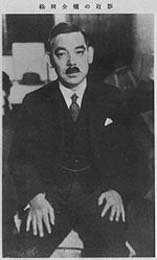
found his niche in military history by galland leadership and the utterance of one word; during the Battle of the Bulge (1944), when his unit of the 101st Airborne Division was surrounded at Bastogne, a strategic road and rail junction in Belgium, as assistant commander of the 101st, responded to a German surrender ultimatum with a now-famous reply: 'Nuts!'.
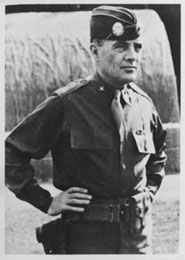
an able strategic planner and field commander, served with the British Expeditionary Force in France and with the Home Forces at the start of the war; in May 1941 was appointed adviser to Gen Auchinleck, then C-in-C in North Africa, but lost his post over disagreements with Auchinleck about the reorganization of his armored forces; was nevertheless appointed Chief of Staff to Gen Alexander, who succeeded Auchinleck in August 1942, at a critical point in the Desert War; here earned the great respect of his commander, taking a key role in the planning for the final stages of the Battle of Alamein, which Alexander later judged crucial to its success. commanded the British X Corps during the landings at Salerno in September 1943, at the start of the Allied invasion of Italy; subsequently directed his forces in the grueling campaigns against Kesselring's withdrawing forces on the Italian peninsula, notably at Cassino; promoted commander of the 8th Army to succeed Gen Leese in November 1944, saw the campaign in Italy throuth to its end on May 2, 1945, when German forces in Italy finally surrendered; is widely regarded as having made an important contribution to that hard-won success.

Australian statesman who became Prime Minister in April 1939, after winning the leadership of the liberal United Australia Party; over the next two years headed a minority government, devoting his energies to preparing for war, establishing new ministries and introducing conscription; was actively concerned to support British conduct of the war - troops warships were sent to the Middle East, foot and raw materials went to Britain; other members of his cabinet expressed a popular view in doubting Britain's guarantees of Far Eastern security; his long visit to London from January to June 1941 encouraged the view at home that he was in thrall to Churchill; faced by revolt in his cabinet, resigned as Prime Minister in August 1941, and his party fell from power on October 6; the Labor party under Curtin then governed Australia fo the rest of the war, but he returned to the premiership from 1949 until his retirement in 1966.

Soviet Chief of the General Staff at the outbreak of war in 1939, having commanded the 7th Army for the breakthrough of the Mannerheim Line in the Russo-Finnish War, was soon replaced as overall commander by General Zhukov; subsequently commanded various Russian Fronts and was for a time Deputy Commander-in-Chief of the Russian Western Front, before being transferred to the Far East to command the Far Eastern Front in the offensive against the Kwantung Army in August 1945; was awarded the Order of Victory, the most lavish and prestigious honor given to senior Soviet commanders.
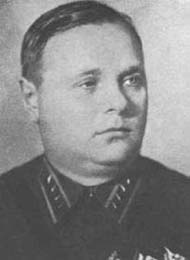
commander of the US 5307th Composite Unit, better known as Merrill's Marauders, from January 1944; the unit was composed of volunteers in the doctrines of British Brigadier Orde Wingates, who pioneered the use of long-range penetration tactics in Ethiopia and with Chindit nits in Burma; posted to Rangoon at the outbreak of the Pacific War, was retained by Chinese forces commander US General Stilwell and fought under him with the Marauders during the drive to recapture northern Burma between March and August 1944, playing an important part in operations at Myitkyina; after a short period in the hospital due to illness in mid-1944; returned to become deputy US Commander of the Burma-India theater and later Chief of Staff of the US 10th and 6th Armies.

one of the most experienced and successful of the senior Italian commanders, commanded Axis troops in the Western Desert; a veteran of the fighting in Libya (1911), Ethiopia (1935-6) and Albania (1939), took part in the disastrous invasion of Greece before being sent to the Eastern Front in command of the Italian Expeditionary Force at the start of the German invasion of Russia in June 1941; in early 1943, when Rommel's army was reorganized, returned to Africa as C-in-C of the Italian 1st Army in Tunisia; surrendered in May 1943, along with over 250,000 troops; subsequently returned to Italy as Chief of Staff under Marshal Badoglio's government but was replaced in 1945.
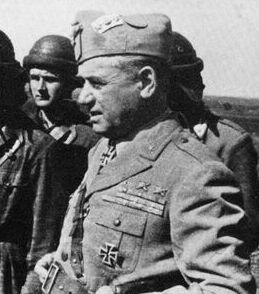
Greek military and political leader; an extreme royalist, was appointed Prime Minister by King George II in 1936 and soon turned his regime into a dictatorship; although he displayed pro-German sympathies, successfully united the country against the Italian invasion of 1940; his sudden death on January 29, 1941 removed a formidable obstacle to Churchill's plans to send a British force to Greece.

Yugoslav soldier and leader of the Serbian Chetnik resistance group, which he founded with other officers after the German invasion of April 1941; with the support of King Peter II's exiled government, received aid from both Britain and Russia; strongly royalist and a Serbian nationalist, his aims wer incompatible with those of the communist partisans, the other important resistance movement in Yugoslavia, and by November 1941 the two groups were in open conflict; anxious to minimize civilian casualties, soon began co-operating with German and Italian forces against the mutual communist foe, and the partisans did most of the fighting against Axis forces; remained nevertheless in contact with London, and it was not until mid-1943 that the collaborative leanings of the Chetniks became clear to the British; in November of that year was warned to stop collaborating and by May 1944 all British missions in Chetnik territory had been recalled; when partisan leader Tito signed an agreement with Subusic, King Peter's Prime Minister, was removed from his post as War Minister in the exiled government; by September was forced to quit his headquarters in Ravna Gora; after the defeat of the Axis forces in Yugoslavia, remained hidden in the hills; was captured on March 13, 1946, tried as a collaborator and executed in July.

Deputy Premier of the Polish government-in-exile and its Premier from April 1943, when he succeeded General Sikorski; an able and committed defender of Polish interests, was involved in the quarrels with the Soviet Union and the Allies over the post-war boundaries of Poland and the Katyn massacre, resigning his post in November 1944 in protest against the Allies lack of support of Polish Free forces after the disastrous battle for Warsaw; returned to Poland as Deputy Prime Minister in 1945, one of the few members of the exiled government chosen to join the communist-dominated coalition, the Lublin Committee; was purged and forces into exile two years later.
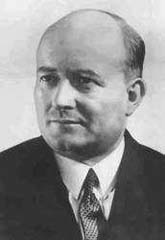
the prime architect of the Luftwaffe; after serving with both air and infantry units in World War I, entered the civil aviation industry as an administrator and rose to become head of the national airline, Deutsche Luft Hansa, in 1929; his outstanding organizational gifts allied to his personal friendship with Hermann Göring, led to his appointment as Göring's deputy at the Ministry of Aviation in 1933; with the rank of colonel, took practical charge of the secret growth of an air force; when its existence became public in 1935, became Inspector General of the Luftwaffe, and effectively ran the rapidly-expanding organization while Göring concentrated on his growing political empire; his efficiency in making the Luftwaffe so powerful so quickly was recognized by Hitler and led to successive promotions; after commanding the air army for the attack on Norway (Luftflotte V) in 1940, reached the rank of field marshal; during the same period his relations with Göring were cooling and the latter concentrated greater power in the hands of Udet from 1939; although he retained a position of influence, was unable to prevent the chaos that enveloped the German aviation industry under Udet's technical dictatorship; two years later, at the end of 1941, Udet's suicide put him back in full control of Luftwaffe production and development; energetically set about reviving industrial output, though was finally unable to compensate for long-term errors in design selection; was not able to persuade Hitler of the importance of fighter aircraft for home defense, and in particular the Me-262 jet fighter was miscast as a bomber against his advice; was an ardent supporter of Hitler, had a Jewish father, but was 'Aryanized' by providing documentary proof that his mother had borne children by another man; suffered from open paranoia in his dealings with other leading figures and his administrative work was punctuated by a series of inplacable enmities, often directed against aircraft designers; arrested by the Allies in 1945, was tried as a war criminal and sentenced to life imprisonment in 1947; was released on parole eight years later.
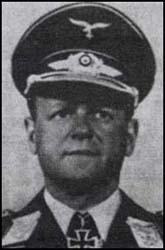
American pioneer naval aviator, expert on naval avaiation and Commander of the Fast Carrier Task Force in the Pacific from January 1944; commanded the aircraft carrier Hornet for the Doolittle Raid and at the Battle of Midway; was next appointed Commander of Fleet Air, Solomon Islands, headquartered at Guadalcanal in April 1943 and later, in 1944, commander of Carrier Division 3 (later known as Fast Carrier Task Force 58); under his leadership, the Fast Carrier Task Force became a highly effective tactical weapon in countless operations, including the key battles of the Philippine Sea, Leyte Gulf, and Okinawa, providing crucial air cover and air strike power to the US Pacific offensives throughout 1944 and 1945; after the war, turned down an appointment as Chief of Naval Operations to lead the US 8th Fleet and then the Atlantic Fleet, which he commanded until his death in 1947.
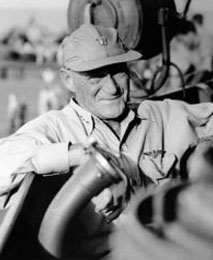
German Army commander, his fierce loyalty to Hitler was the basis of his career and his energy, aggressiveness and frankness earned him a special reltaionship with the Führer; was Chief of Staff of the IV Corps in Poland in 1939, and of the 16th Army during the Western Offensive the following year; for the invasion of Russia was given command of the 3rd Panzer Div, and in 1942 took control of the 9th Army; remained on the Eastern Front until August 1944, becoming known as the 'Führer's Fireman' as he was switched from one Army Group to another to check Russian offensives; highly successful in restoring stability to his hard pressed commands, his willingness to ignore impossible orders and impose his pragmatism on Hitler did not cost him his position, and was transferred to France after the Allied invasion of Normandy as C-in-C of the theater; with the return of von Rundstedt to command the front in September 1944, retained command of Army Group B, then in the Netherlands; characteristically, informed Hitler that its position was untenable, but nevertheless organized the successful defense of Arnhem; after the German defeat at the Battle of the Bulge, Army Group B was trapped in the Ruhr pocket, and he disbanced his doomed forces before shooting himself - the traditional response to defeat of a German field marshal - on April 21, 1945.
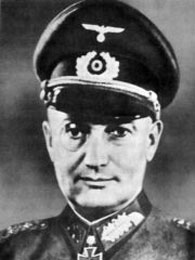
Soviet Foreign Minister from 1939 to 1952, described by Churchill as totally ruthless; replacing Litvinov as Commissar for Foreign Affairs in May 1939, figured prominently in the negotiations that led to the Russo-German Pace and subsequently became executor of Stalin's labyrinthine wartime foreign policy; during the following year, when German military successes in Europe were placing new strains on the Soviet-German relationship, discussed a four-power (Germany, Russia, Italy and Japan) pact with Hitler in Berlin; the proposal stumbled, however, on the Soviet requirement of a German withdrawal from Finland; when the German invasion of the Soviet Union was launched in 1941, it was Molotov who announce the attack to the Soviet people. the necessary change in foreign policy direction precipitated by the German invasion was steered by the five-man State Defense Committee on which he served throughout the war; promises of assistance for Russia from the Western Allies was formalized by him in the signing of the Mutual Assistance Pact with Britain (July 1941) and Lend-Lease agreements with Britain and the US; a 20-year Anglo-Soviet treaty was signed in May 1942, and he also received reassurances about the opening of a 'Second Front' against Germany in the same year, although Churchill travelled to Moscow in August to explain to Stalin why these promises could not be fulfilled. nevertheless, his chairmanship of the Moscow Foreign Ministers' Conference in 1943 laid the groundwork for the Tehran Conference, at which a European invasion date was finally agreed; in 1945, accompanied Stalin at the major Allied Conferences at Yalta, San Francisco and Potsdam, which were to establish the post-war European structure. his long career as Stalin's close associate was ended with the arrest of his Jewish wife; after Stalin's death, lost favor in the Khruschchev era; his reputation was not fully rehabilitated until two years before his own death.
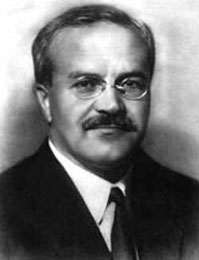
one of the best known and most controversial of British field commanders and Chief of the Imperial General Staff after the war, his notorious immodesty and poor relations with many of the Allied military chiefs have not detracted from his reputation as a popular and able leader, and skilled self-publicist; in command ot 3rd Div during the Battle of France, was among the last to be evacuated from Dunkirk and was subsequently promoted to command V and XII Corps; after an important period of troop training was sent to North Africa to replace the 8th Army commander, Gen Gott, immediately following the first British check to Rommel's overstretched eastward advance through Egypt at El Alamein in August 1942. under the leadership of the newly appointed C-in-C, Gen Alexander, rallied the exhausted 8th Army and directed his most notable victory against the expected Axis offensive, first at Alam Halfa and then at El Alamein in September and October; although critics have argued that the record ignores the obvious contribution made by the planning of Alexander's predecessor, Auchinleck, to Montgomery's autumn victories, the attention to troop morale, cautious preparation, planning and precise execution that were his hallmark, certainly contributed to the first great British victory of the war. in the subsequent Allied Torch offensive in North Africa, the Allied invasions of Sicily and Italy in the following year, and in the invasion of Northwest Europe in 1944, his contribution continued to be competent, though often criticized as overcautious, based on the elements of force, frontal assault and close control, rather than on initiative and maneuver; following the breakout from Normandy (which had been slowed by his expensive failure to capture Caen), and his failure to make use of his success at Antwerp, he came increasingly into conflict with his superior, Gen Eisenhower, over strategy; his obsessive rivalry with US Gen Patton and his tactless and temperamental attempts during 1944 to press Eisenhower for a single-front strategy, with Montgomery at its head, instead of the co-operative broad-front approach favored by Eisenhower and Gen Bradley, were repeatedly criticized. it is worth noting, nonetheless, that he displayed a great resilience and consistent commitment to Allied efforts in all the war theaters in which he served, retaining throughout the confidence and loyalty of his subordinates; after VE day, commanded the British occupation forces, was named CIGS in June 1946, and later served as Deputy Supreme Allied Commander in Europe (NATO), 1951-8.

was chief of staff to the supreme commander and drew up the initial plans for Operation 'Overlord' (the Allied invasion of Normandy), which were accepted in July 1943.
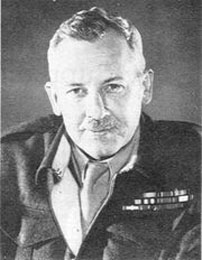
Australian soldier who rejoined the army from civilian life in 1939 and commanded the 9th Australian Div in the Middle East; led his troops through the siege of Tobruk and the battles around El Alamein before his forces were recalled to the Far East; next commanded Australian forces against the Japanese in New Guinea, and in 1944 was made GOC of the New Guinea force and Commander of the 2nd Australian Army; ended the war in control of Allied operations in Borneo.
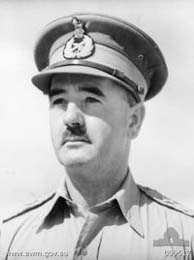
highly respected naval commander and Supreme Allied Commander in Southeast Asia from 1943 until his acceptance of the Japanese surrender in that theater in September 1945; Commander of the 5th Destroyer Flotilla which took command of the evacuation of Norway in June 1940, was chosen to succeed Adm Sir Roger Keyes in charge of Combined Operations in 1941; becoming a member of the Chiefs of Staff Committee in March 1942, planned teh Dieppe and St Nazaire raids and undertook preliminary planning for the invasion of Northwest Europe before being selected by Churchill and Roosevelt to head the reorganized Southeast Asia Command, as Supreme Allied Commander; in this post, saw his greatest challenge, working in the face of complex political, command and logistical difficulties; subesequently directed the lengthy reconquest of Burma and Singapore; was later made Earl Mountbatten of Burma and served as the last supervising Viceroy of India, First Sea Lord, and in 1959, chairman of the Chiefs of Staff Committee; a first cousin of the queen, was killed by a bomb while on holiday in Ireland.
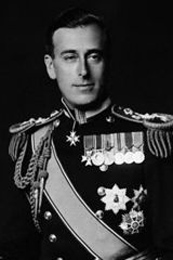
Dutch Quisling leader; founder of the National Socialist movement in the Netherlands, was appointed leader of the Dutch people by Berlin in 1942 following the German occupation; in a nation so fiercely anti-Nazi, however, his following was never large; was arrested at the end of the war and hanged at the Hague in 1946 as a collaborator.

raised in one of the poorest regions of Italy; worked as a laborer and teacher before starting his political career; kicked out of the Socialist Party for supporting Italy's entry into World War I; declared war on socialism and founded the Fascist party; Fascists gained power and the bombastic Il Duce (Leader) ruled Italy as a dictator from 1922 to 1943; had come to power in the chaotic years immediately following World War I, when Italy was in a state of economic and political collapse; was popular in the early years of his rule, sought to restore Italy's lost military glory, even though the nation was weak and impoverished; launched a number of campaigns (Ethiopia, North Africa, Greece, and East Africa) that proved disastrous; was a participant in the Munich Conference in 1938 that carved up Czechoslovakia; declared war on the Western Allies in June 1940, when a German victory in France was certain; his failures became a burden on Hitler, who was forced to rescue his army in Greece, Albania and North Africa; was deposed by the Fascist Grand Council in July 1943 as the Allies prepared to invade the Italian mainland; was interned and rescued by Nazi paratroopers; headed a puppet government in German-occupied northern Italy; as Italy fell to the Allies, was executed by Communist partisans along with his mistress, Clara Petacci, in April 1945.
